Jacob Stockdale, Helmut Kohl and me - we were all April 3rd babies.
Just as he sometimes gets the lucky bounce of a rugby ball, Jacob has the good fortune to be part of a post Troubles generation. He was born in 1996 - two years after the IRA ceasefire and two years before the Good Friday Agreement.
His father, Graeme, served as a dynamic Presbyterian minister before concentrating on two jobs, chaplain at Maghaberry prison and at Newry Hospice.
His mother, Janine, has similar caring instincts. She now lectures in midwifery at Queen’s University.
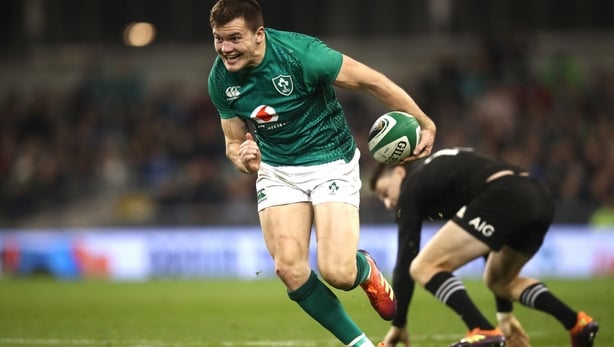
The Stockdales brought up their three children, Hannah, Lydia and Jacob in a Northern Ireland slowly getting used to relative peace and power-sharing.
This weekend Jacob will stride onto the Landsdowne Road turf as part of a team captained by another Ulster Protestant.
A year from now Rory Best, OBE will be spending more time as a beef and tillage farmer in Co Down. But today the 36-year-old will do his level best to lead Ireland to victory during his final encounter against the nearest neighbours, England.
In the best traditions of rugby, Irish fans are likely to stand and maintain a respectful silence as visiting English supporters and their team empty their lungs during God Save The Queen.
God Save Our Gracious Queen
Long live our noble Queen,
God Save the Queen:
Send Her Victorious,
Happy and Glorious,
Long to reign over us,
God Save the Queen.
O Lord, our God, arise,
Scatter thine enemies,
And make them fall.
Confound their politics,
Frustrate their knavish tricks.
On thee our hopes we fix:
God save us all.
When the camera pans down along the Irish line during Amhrán na bhFiann, Rory Best and Jacob Stockdale, are likely to be silent. Sentiments aside, they would not be familiar with the Irish words or the English translation.
Soldiers are we,
whose lives are pledged to Ireland,
Some have come from a land beyond the wave,
Sworn to be free,
no more our ancient sire land,
Shall shelter the despot or the slave.
Tonight we man the gap of danger,
In Erin’s cause, come woe or weal,
’Mid cannon’s roar and rifles’ peal,
We’ll chant a soldier’s song.
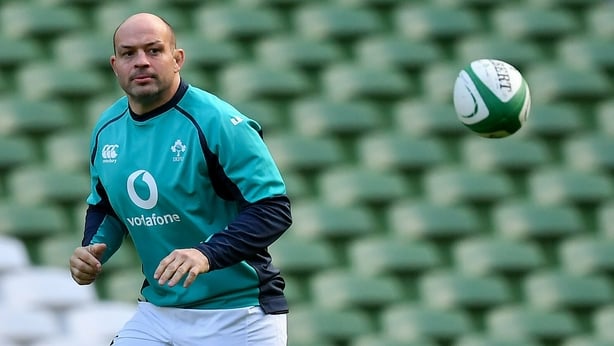
But the pair may join in a phrase or two of "the compromise anthem", the one devised to promote inclusiveness, Ireland’s Call, the work of the Derry stroke Londonderry composer, Phil Coulter, son of an RUC man.
Come the day and come the hour,
Come the power and the glory,
We have come to answer
Our Country's call
From the four proud provinces of Ireland,
Ireland, Ireland
Together standing tall
Shoulder to Shoulder
We’ll answer Ireland’s Call
We’ll answer Ireland’s Call
Ireland is coached by a New Zealander, Joe Schmidt. England’s boss is an Australian, Eddie Jones. The Irish team includes C J Stander, born in South Africa and Bundee Aki, of Samoan descent and brought up in New Zealand.
England has Billy and Mako Vinapola, born in Tonga and Manu Tuilagi, a native of Samoa. Those five players and Joe Schmidt have all qualified for a new passport by living and working in their adopted countries.
Sport has a capacity to take us beyond borders.
The Germans have a view about borders
Just like Jacob Stockdale, another 3 April baby, Helmut Kohl, was lucky in the timing of his birth. He was born in the German town of Ludwigshafen in 1930. His only brother, Walter, died as a 19-year-old soldier in 1944. As a 10-year-old Helmut was obliged to join the Deutsches Jungvolk, a section of the Hitler Youth.
Two weeks after he turned 15, on 20 April 1945, he was drafted for military service. But World War 2 was coming to an end and fortunately he was not drawn into combat, a fact he later referred to as "the mercy of late birth".
Kohl was German Chancellor for a staggering 16 years, from 1982 until 1998. During that period Europe’s Single Market was designed and implemented; the Berlin Wall collapsed and Germany was reunited; the Cold War ended and the Soviet empire broke up; the European Union expanded; the EU’s Common Agricultural Policy was reformed and plans were advanced for the introduction of the Euro.
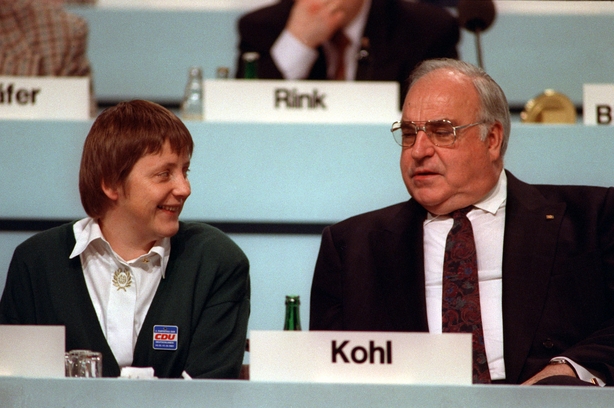
Kohl’s period as the most influential leader in Europe coincided with the decade that Jacques Delors served as President of the European Commission (1985-95). It was the phase when Ireland proved the most successful of the EU’s four poorest member states (Greece, Portugal, Spain and Ireland) at absorbing and using structural funds to improve its economy and infrastructure.
A senior Irish politician once gave me his eye-witness account of how the deadlock was broken during EU discussions about budget plans.
Poorer member states, Ireland included, supported by the European Commission, were pushing for an increase in the EU kitty. The wealthier countries were resisting, sure in the knowledge that they would be required to pick up the tab.
Once reference was made to the EU’s origins and how it was the structure that emerged from a continent devastated by World War 2, Kohl metaphorically put his hand deeper into his pocket and committed Germany to increasing its level of payments.
Kohl was an astute political operator. But nothing could have prepared him for the emotional earthquake that followed after East Germans flooded through the Berlin Wall in November 1989. The impossible was happening before Kohl’s eyes and soon provision would have to be made for the reunification of his homeland.
The mismatch in the neighbouring economies was glaringly obvious. But sentiment over-ruled all other instincts and sciences. On Kohl’s instructions, the East Mark and powerful Deutsche Mark were converted at par on 1 July 1990. The East Germans were given parity of esteem, regardless of the misgivings of the financial experts.
Five months later, in November 1990, I travelled from RTÉ’s Brussels office to Paris. An organisation called the CSCE (Council for Security and Cooperation in Europe) was meeting to agree what it called ‘A Charter for a New Europe’. But in a very real way the gathering was to celebrate the ending of the Cold War and the reunification of the Germany, the EU’s largest member state.
So many of the heavy hitters turned up, including Helmut Kohl and the host, the French President, Francois Mitterrand. There were 35 delegations in all, including the United States and the USSR. Charlie Haughey was Taoiseach at the time.
There had been significant bad blood between Germany and the UK because Margaret Thatcher (and others too) had reservations about the possible emergence of an all-powerful Germany in the medium term.
But good manners dictated that Mrs Thatcher should travel to Paris, even though that very night in Westminster, Michael Heseltine, her Conservative party colleague, had tabled a vote of confidence to challenge her leadership.
It was a pre-internet and pre-smart phone era. I remember the night vividly because I was keen to keep abreast of the developments in London while the big shots were dining.The only hotel I could find with BBC channels for its guests was the Concorde Lafayette, (now the Hyatt Regency), at the bottom of Avenue de la Grand Armee, near the Irish embassy on Rue Rude.
As I was heading up to my room, several floors above, a woman in a fur coat entered the swish lift. After the doors closed and the journey began, she asked in French if I needed a blanket for my room.
Having just left a credit card imprint for a significant sum at the hotel reception, it seemed a daft question and I decided the room would have standard facilities. Her offer declined, the woman pushed a button and exited the lift to allow me complete my journey.
The delayed understanding of what had been a brief encounter with a high-class hooker was dawning as I switched on the television in my room. On the small screen Margaret Thatcher was emerging from the British Embassy in Paris. She almost tripped across a startled BBC political correspondent, John Sergeant.
Margaret Thatcher: "Just a moment. Good evening. Good evening gentlemen."
Bernard Ingham (Thatcher’s Press Secretary): "Where is the microphone?"
John Sergeant, BBC: "It is here. This is the microphone."
Margaret Thatcher: "I am naturally very pleased that I got more than half the Parliamentary Party and disappointed that it's not quite enough to win on the first ballot, so I confirm it is my intention to let my name go forward for the second ballot."
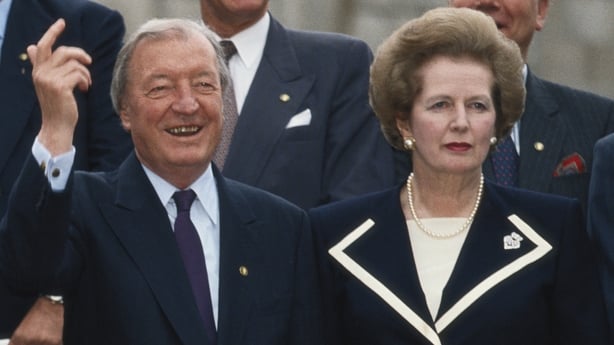
The absent prime minister had received 204 votes and Michael Heseltine 152 in the vote among Conservative MPs. There were 16 abstentions. Although she had a clear majority of 52, she was four votes short of the 15% margin required to end the contest.
Mrs Thatcher’s Paris statement, that she would let her name go forward for a second ballot, quickly changed. Two days later, back in London, she broke down in tears in front of her ministers after announcing her resignation and she was driven away from Downing Street.
Ancient Quarrels
It was such an irony that Margaret Thatcher had been shafted while she was away in Europe. She had a difficult relationship with the EU’s two most powerful member states, Germany and France. She spent much of her premiership pursuing and eventually winning a reduction in Britain’s contribution to the EU budget.
The UK’s uneasy relationship with the land mass south of Dover did not just colour the actions of Mrs Thatcher or the prime minister who succeeded her, John Major.
The tension and distrust have been recurring themes for centuries.They feature in the Saoirse Ronan film, Mary Queen of Scots. They are there too, in vivid detail in the film, The Favourite, about the 18th century monarch, Queen Anne.
In her strained relationship with Helmut Kohl during her final months in office, Margaret Thatcher did not understand how deeply the notion of borders burrowed into the German psyche.
Theresa May, her conservative party, and her alter ego on the Labour benches, Jeremy Corbyn, are currently making the same misjudgement. In this instance the issue is the border on the island of Ireland.
Mrs May and her supporters are miscalculating the views of Ireland and of the European Union, including its most powerful member state, Germany.
The EU dimension is the wider canvass that calmed the centuries-old hostilities between the two neighbouring islands beyond the landmass of Europe.
Ireland and the UK together joined the then EEC in 1973. We surprised ourselves by discovering how much we had in common around the European table. We agreed to get rid of our customs border when the ‘Europe without frontiers’ EU Single Market was introduced in 1993.
And we devised an Irish version of the EU reconciliation through co-operation model to inspire and shape the Good Friday Agreement of 1998.
Theresa May’s misfortune is she became Prime Minister on the firm understanding that she would successfully negotiate the UK’s exit from the European Union. David Cameron handed her that hospital pass and slipped away.
But it was her own deliberate action which created the general election that left her depending on 10 DUP members to keep her in power.
That beholding arrangement drove her to make the most public of policy u-turns in Westminster last Tuesday. Faced with principles and the instinct to stay in power, she made her choice.
In 1998, under Ian Paisley’s leadership, the DUP were the only major Northern Ireland party to oppose the Good Friday Agreement. They consciously were not in the room when the Agreement was signed.
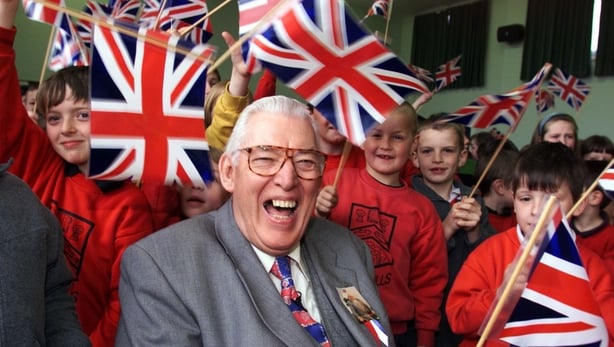
In the Referendum to endorse it, they actively campaigned against it. All 10 members are entirely consistent with their history when they insist their place in the United Kingdom must over-ride what is the most significant internal political settlement and peace process in the EU’s history.
Theresa May’s first effort to uphold the UK’s responsibilities as a co-guarantor of the Good Friday Agreement in the context of the Brexit negotiations was to have a Northern Ireland only backstop until the future trading relationship between the EU and the UK was sorted out.
But the DUP leader Arlene Foster phoned the Brussels meeting in December 2017 where Mrs May was pursuing that formula and blocked it.
So after several months of fresh negotiations, the British Prime Minister proposed to the EU that the backstop idea should apply to the UK, not just Northern Ireland. She pleaded with her party and the DUP to support her. But the DUP combined with the Brexiteers in the European Research Group (ERG) to block that Withdrawal Bill two weeks ago.
Theresa May is a prime minister lacking the support base to lead. Her new formula is to ask the EU, Ireland included, to accept the hospital pass that she can’t handle.
In the Westminster theatre that has become her prison; some of the cast of characters test the notion of caricature.
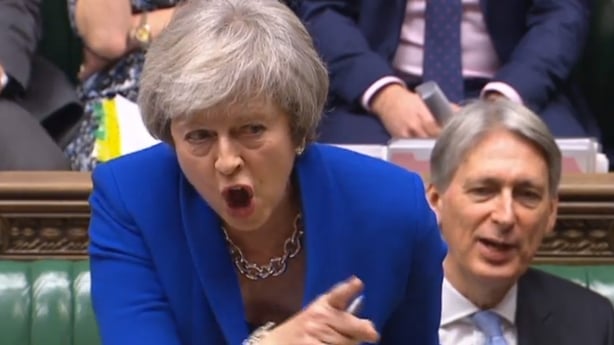
The Speaker of the House of Commons who invites the cameras in to film him getting dressed, new tie included. The leader of the Labour party, with his history of dissent, refusing to allow an intervention from one of his own members, because he knows she disagrees with him. The level of ignorance about Ireland-related issues: the sound of silence from the missing in action seven Sinn Féin abstentionists, leaving Sylvia Hermon, the widow of a former RUC Chief Constable, the only voice to challenge the Northern Ireland perspective as presented by the DUP.
As the SNP leader, Ian Blackford, was on his feet last Tuesday, warning how a No Deal Brexit could lead to food shortages, the DUP’s Sammy Wilson shouted 'Go To The Chippy’.
This is the same Sammy Wilson who works on Christmas Day with the Salvation Army team, providing food to dozens of needy Belfast citizens. The Sammy Wilson who sat alongside Martin McGuinness at the funeral of Brian Lenihan in Porterstown’s Catholic Church in 2011.
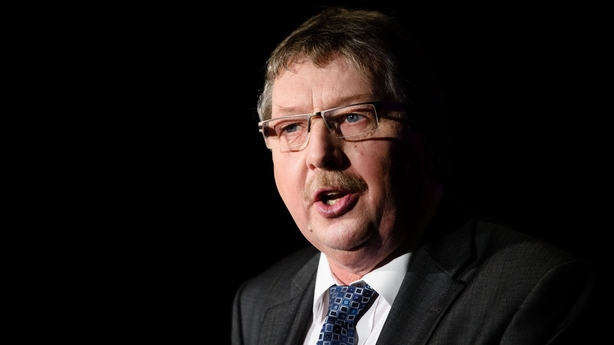
The MP for East Antrim has much more to him than a heckler role for hard Brexiteers. But in the House of Commons theatre, his reverts to pantomime mode.
'MAYhem' and the Queen
Days before the latest ‘MAYhem’ in Westminster, 92-year-old Queen Elizabeth was addressing members of the Women’s Institute in Sandringham, to mark the 100th anniversary of their organisation.
She said: "of course every generation faces fresh challenges and opportunities" and continued "as we look for new answers in the modern age, I for one prefer the tried and tested recipes like speaking well of each other and respecting different points of view; coming together to seek out the common good: and never losing sight of the bigger picture."
She concluded, "to me, these approaches are timeless, and I commend them to everyone".
This was the monarch who addressed the banquet for the visiting President of Ireland, Michael D Higgins, at Windsor Castle in 2014. She said that evening: "the goal of modern British-Irish relations can be simply stated. It is that we, who inhabit these islands, should live together as neighbours and friends. Respectful of each other’s nationhood, sovereignty and traditions. Cooperating to our mutual benefit. At ease in each other’s company. After so much chequered history, the avoidable and regrettable pain of which is still felt by many of us, this goal is now within reach."
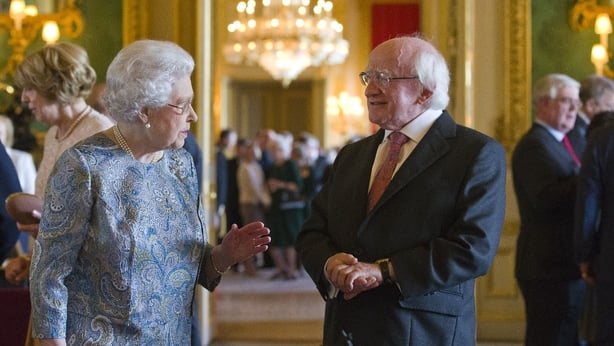
In the wall to wall analysis about Brexit emanating from the Westminster bubble, was there even a sentence given to how Queen Elizabeth might feel about the row over "the Irish backstop?"
This afternoon, we might all take a break from Brexit and, in the best traditions of the Romans and their appreciation of the value of bread and circuses; we will all devote our full attention to the Aviva.
Arlene Foster is a keen rugby supporter. Ulster rugby in particular. It is true that her near neighbour, Chris Farrell, from Fivemiletown has crossed the porous border and is now making a living as a welcome and valued member of the Munster squad.
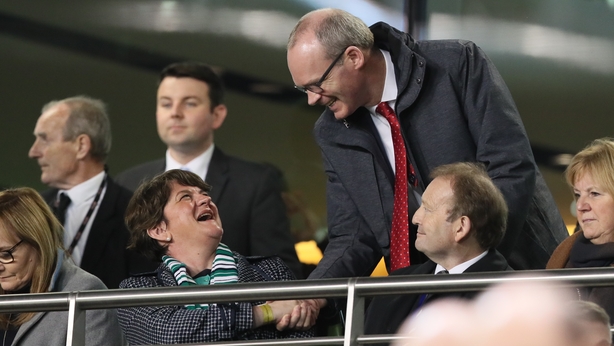
If he steers clear of injury, he has a great chance of making the Ireland squad for the World Cup in Japan along with several Ulster natives.
In the closing minutes of today’s game, if the Munsterman, Peter O’ Mahony steals a ball from a ruck and Bundee Aki, the adopted Irishman fires a pass to the Ulsterman, Jacob Stockdale, maybe Arlene like the rest of us will be in seventh heaven as he heads over the line. Maybe we will celebrate like the revellers who attend those champagne parties in the London home of Jacob Rees-Mogg.
Sport has a capacity to take us beyond our borders and to shed some light on the strains and themes in our complicated lives.






